Fri 15 Aug 2014
A Western Movie Review by Jonathan Lewis: THE TEXAS RANGERS (1936).
Posted by Steve under Reviews , Western movies[11] Comments
THE TEXAS RANGERS. Paramount Pictures, 1936. Fred MacMurray, Jack Oakie, Jean Parker, Lloyd Nolan, Edward Ellis, George “Gabby” Hayes. Based on The Texas Rangers (1935), by Walter Prescott Webb, a non-fiction history of the first hundred years of the famed law enforcement agency. Director: King Vidor.
The Texas Rangers is a quite fun, if sometimes predictable, 1930s Western. Directed by King Vidor and starring Fred MacMurray, the movie benefits from an overall solid cast, some great scenery, a devious villain, and enough personal conflicts between the characters to keep you engaged with the story throughout the film’s running time of a little over ninety minutes.
While The Texas Rangers is not the type of film you watch for the cinematography or to explore frontier psychology, it is worth viewing for its good direction, plot twists, and some rugged, well choreographed, frontier action. There’s an especially harrowing sequence involved Indians rolling boulders down a hill in order to maim and murder some Rangers that is really something to behold.
The movie begins, like many a Western, with bandits holding up a stagecoach driven by a semi-comical character by the name of Wahoo Jones (Jack Oakie). Soon enough, it turns out that Wahoo is in cahoots with the bandits, his friends Jim Hawkins (MacMurray) and Sam McGee (Lloyd Nolan). After the robbery, the men decide to part ways. McGree heads off to seek his Mexican girlfriend. Wahoo and Jim decide to stick together, eventually joining the Texas Rangers.
But the three men will be reunited soon enough. Out on patrol for cattle rustlers, Jim and Wahoo, now both Texas Rangers, find out that their old friend Sam is now living in their small part of the world. A plan is hatched, with the men deciding that they’ll work together on a criminal scheme, utilizing inside information that Jim can obtain now that he’s a lawman.
And as might be expected from a movie such as this, Jim eventually has a change of heart about his criminal ways, setting the stage for a confrontation with Sam (Nolan). Unlike some other Westerns I’ve watched recently, in this one at least, the protagonist’s change in mindset is gradual, haphazard, and believable. Up to the very end at least, he really doesn’t want to harm his former partner in crime.
Although MacMurray is quite good in this, it’s Nolan’s character that is more dynamic and interesting. There’s something universal about his being that’s just plain villainous. Sam McGee wouldn’t seem all that out of place in 1930s New York. He just seems a bit more gangster than outlaw. He’s truly ruthless, someone who isn’t above murdering an old friend for the sake of maintaining his criminal ways.
In conclusion, The Texas Rangers isn’t a particularly deep or introspective film, as much as a well paced, gripping action movie set on the Texas frontier. Its depiction of Native Americans isn’t especially enlightened, but that’s to be expected. And with the exception of Sam McGee, the movie’s main characters can at times come across as somewhat one-dimensional. But that doesn’t stop the film from being an above average Western, one that tells a story about men in a certain time and place, and which tells it very well.
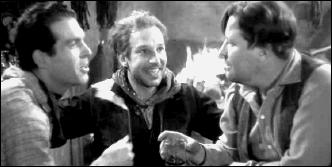
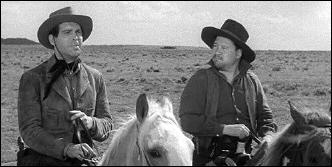
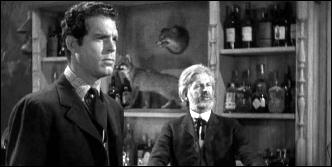
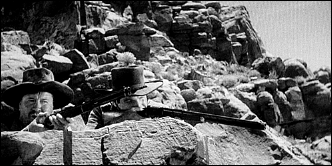
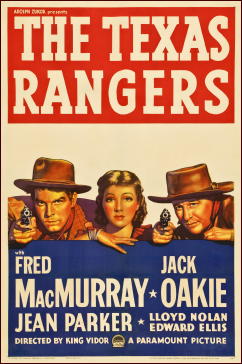
August 15th, 2014 at 9:51 pm
My guess is you have acquired the Classic Western Round Up, from Universal, volume 1. All I will add to your comments is that King Vidor had a fine feel for filmic choreography, and he managed to almost always get the best out of his people. MacMurray was a revelation to me, not for his muscular athleticism but for the fact that his performance grows on subsequent screenings. Lloyd Nolan is always effective, but here Jack Oakie creates a fine vulnerable effect and his influence on MacMurray, both before and after Wahoo’s death, allows for enough growth to make one wish, by one I mean me, that in his later westerns, MacMurray had managed to continue his low key, and quite effective approach to what might have been a part played by Wayne, Scott or McCrea. So, this means I liked the picture a lot. When we get to Canyon Passage I will have something contentious to say.
August 15th, 2014 at 10:26 pm
I’ve not seen this film, but it seems as though I should. I’m a big fan of Lloyd Nolan, perhaps not when I was younger, but more and more as I’ve gotten wiser. Nonetheless, I confess I didn’t recognize him right away in the photo at the top of the review. Jon sent it to me to include, and my first reaction was, Who’s that guy?
August 15th, 2014 at 11:05 pm
Steve,
He looks, and sounds, just a little different. You should enjoy his performance.
August 15th, 2014 at 11:12 pm
I haven’t seen this movie in a while. The remake Streets of Laredo is the one which is shown most often. It starred William Holden, William Bendix and MacDonald Carey. Anyone care to compare the two films?
August 15th, 2014 at 11:44 pm
Chuck,
No analysis, just an observation that while they are both effective fun, The Texas Rangers is more stylish and rhythmically shot. The Vidor film takes a story telling convention within the cowboy movie genre and makes a kind of love song out of it.
August 16th, 2014 at 7:48 am
All three stars get a chance to stretch a bit in well-developed characterizaions, and they make the most of it. This was popular enough that Paramount–not a company given to sequels and series–did TEXAS RANGERS RIDE AGAIN in 1940, and MacMurray’s next western at Paramount was called RANGERS OF FORTUNE, even though there are no actual Rangers to be found in it.
August 16th, 2014 at 5:25 pm
Didn’t know of “Rangers of Fortune.” will look it up
August 16th, 2014 at 6:23 pm
Dan reviewed Rangers of Fortune back in February.
August 17th, 2014 at 6:19 pm
Here’s the link to Dan’s review of RANGERS OF FORTUNE:
https://mysteryfile.com/blog/?p=25240
… with a tip of the topper to Barry for remembering this one.
August 17th, 2014 at 3:46 am
The true ‘sequel’ to this was a B called RETURN OF THE TEXAS RANGERS with John Howard. It’s a ‘modern’ western with a Horace McCoy script and may be based on one (or more) of his Jerry Frost Texas Ranger stories from BLACK MASK.
The original was a big hit, and it improves on subsequent viewings. STREETS OF LAREDO would be very good on its own, but pales a bit in comparison to the original though everyone is good in it though Carey lacks Nolan’s charm and it is hard to see why Holden holds back so long.
Nolan’s likabke badman (he manages the neat trick that his villains are both sinister and charming), MacMurray’s reluctant reformation, and Oakie’s sympathetic doomed character are all pitch perfect in this one, and to be honest more than a few actual Rangers ended up on the right side of the law just this way.
Walter Prescott Webb is the dean of Texas Historians and took home a Pulitzer for this one which sold remarkably well for a massive scholarly study (Webb held the chair in history at the University of Texas) His book THE GREAT PLAINS is also a noted history of the west and both are kept in print.
The movie was made for release in 1936 because it was the centennial of Texas independence, and I believe debuted in Dallas for the Texas State Fair that year.
It was the start of a respectable career in westerns for MacMurray who made several good ones over the years, though seldom with the humor shown here. His later adult westerns are good, but dark and fairly grim.
Barry,
For me the best thing about CANYON PASSAGE is Ernest Haycox wrote the novel it is based on. Other than that you likely won’t get an argument from me.
August 11th, 2021 at 2:20 pm
[…] out, this late 1940s Technicolor western was a remake of The Texas Rangers (1936), which I reviewed here some seven years ago. Turns out that I liked the movie well enough, although it doesn’t seem like […]